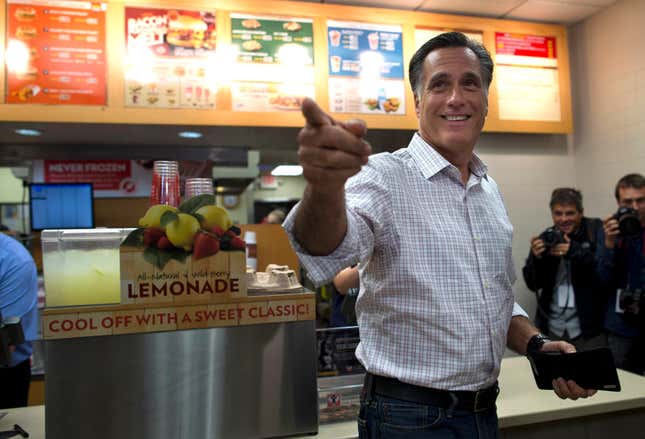
Republican Presidential candidate Mitt Romney has enjoyed a rebound in the polls since the first presidential debate, and in the coming weeks that could make things interesting for… currency traders.
That’s right, Deutsche Bank analysts say. Mr. Romney uttered plenty of things which, if he became president, would likely mean big changes to how macroeconomic markets such as foreign exchange—specifically the US dollar—behave. The only thing is, the changes could go either way. We’ve boiled down the analysts’ Oct. 10 research note as follows:
Romney = Stronger Dollar
Romney has said he’d fire Ben Bernanke. Love him or loathe him, the chairman of the Federal Reserve has had a big impact on financial markets over the last few years. The S&P 500’s nearly 15% gain this year owes a lot to Fed actions, including the third round of quantitative easing (QE) announced on Sep. 13. But if Mr. Romney starts to look like he could win the race, markets would start imagining life without “helicopter Ben”.
That could mean a stronger dollar, which has been weakened by QE (the creation of new money with which the Fed buys bonds). And it could be bad for gold, which people have been buying as a way to hedge against the inflation that some fear the Fed could eventually set off. (There is no sign of that any time soon, though.)
Don’t get too worried, however. Deutsche Bank suggests that if he does make it to the oval office, Romney’s view of Bernanke might be a lot different. “Romney may find that if he is elected, the longer he is in office, the more he becomes ‘addicted’ to QE policies that support growth, and fiscal funding,” the analysts wrote.
Romney = Weaker Dollar
Romney has also said he’d label China a currency manipulator. The US has long complained that Beijing keeps the yuan artificially weak in order to give Chinese manufacturers an unfair advantage. But neither the Bush nor the Obama administrations has officially called the country a currency manipulator, as the US last did in the early 1990s. China is famously sensitive about being told what to do, and in 1994 it devalued its currency further, which helped trigger its massive export boom.
The current policy of non-confrontation has seemingly paid dividends. The yuan has strengthened by more than 7% against the dollar since the end of 2009. And by the way, China remains the largest holder of US government debt. So if Romney were to confront the Asian giant, it might prompt China to trim some of its holdings of US Treasuries, that would dump dollars on the market, weakening the greenback.
So which is it? When pressed to come down on one side or the other, Deutsche Bank analysts suggest that, in the short-term, a Romney resurgence would likely be good for the dollar, as ideas about a change at the Fed and tighter fiscal conditions could shore up the buck. But they stress that this would likely be a blip, and the dollar’s long-term direction will go on being influenced by large global economic factors like trade flows and the size of US deficits.